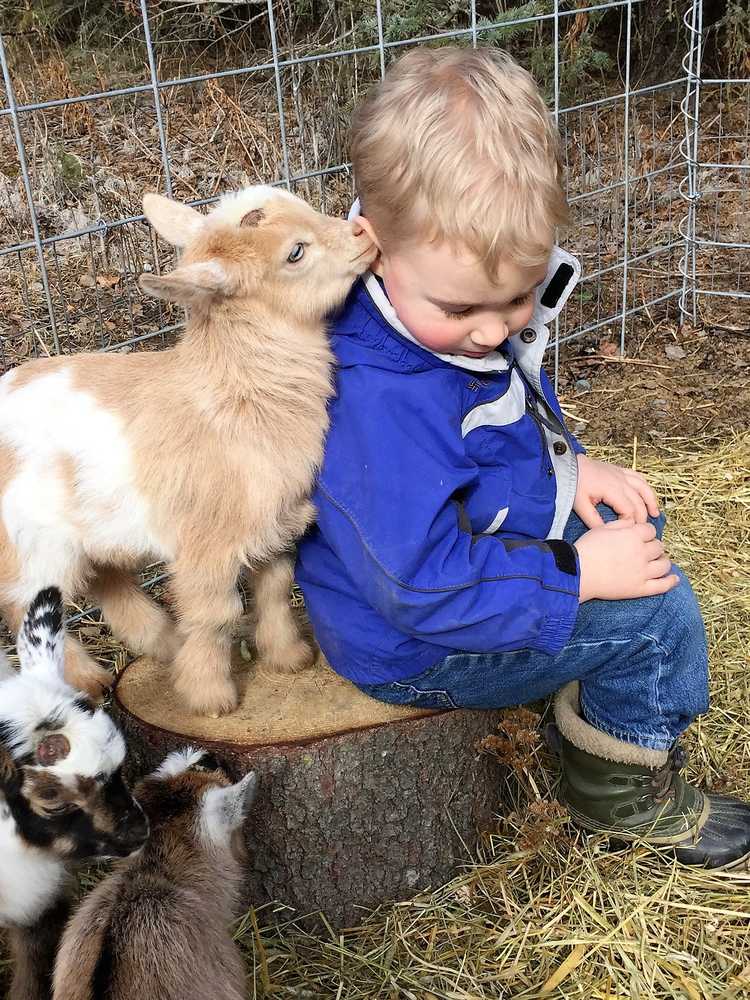Owners of goats and sheep may soon have to permit their animals if the state Board of Game passes a proposal in March.
Domestic goats and sheep are currently on the livestock “clean list” and do not require permits. However, the Board of Game will take up Proposal 90 during its March 18-28 meeting, which would take goats and sheep off the clean list and require anyone raising the animals to have a permit.
The purpose is purportedly to protect populations of Dall sheep, according to the proposal, which was put forward by the Alaska chapter of the Wild Sheep Foundation.
“Domestic sheep and goats have been proven to carry diseases that are devastating to wild sheep populations,” the proposal states. “This proposal will be a good start to prevent the spread of disease into wild sheep populations.”
When goats and sheep are kept within 15 air miles of designated Dall sheep habitat, they would be required to install Alaska Department of Fish and Game-approved facilities and certify the animals as disease-free.
There have not been any recorded cases of disease transmission between domestic sheep and goats and Dall sheep or mountain goats, but the goal is to make sure it doesn’t have the chance to happen, said Kevin Kehoe, the president of the Alaska chapter of the Wild Sheep Foundation.
Pneumonia spreading from domestic sheep and goats to bighorn sheep has been a problem in the Lower 48, and research has indicated that it has led to die-offs in the populations there, Kehoe said.
“At this point, though you could say it would make a stronger case for us if (disease) were out there, we couldn’t stop it,” Kehoe said. “We’re happy that there’s none to this date. All our actions are preventive.”
On the Kenai Peninsula, owners of goats and sheep have objected, saying it is unnecessary and will infringe on small farmers. Shawna Wolk, who raises Nigerian dwarf goats in Kasilof, said if the proposal passes, the fencing requirements would stop her from having her goats because of the expense. Wolk said her property is within the 15-mile buffer around Dall sheep habitats, as she is only 8.5 air miles from the bench lands where the sheep live.
Wolk said she disagreed with the Board of Game interfering with regulation on domestic animals. Instead, the Wild Sheep Foundation and the Board of Game should work with livestock owners on a better solution.
“I think the main thing is the Board of Game’s ability to put any animal on the list is a direct assault on folks’ ability to pursue sustainability and protect their personal private property rights and their pursuit of happiness in a lot of ways,” Wolk said.
Fish and Game officially recommended that the Board of Game take no action on the proposal. In its comments on Proposal 90, Fish and Game noted that the board does not have statutory authority to regulate domestic animals.
Domestic sheep and goats do carry a strain of pneumonia known to be deadly to bighorn sheep in the Lower 48, killing off large portions of the populations there, according to Fish and Game’s comments. There has been transmission between the two species in studies, so keeping the two separate is a management priority.
“As transmission between domestic sheep, goats, and wild sheep is often nose-to-nose, prohibiting direct contact is often the primary goal of agencies managing wild sheep,” the comment states. “Double fences, outrigger fences, or a combination of both around domestic sheep and goats are all accepted and proven forms of preventing contact.”
Megan Green, a Kenai resident, said she disagreed with the idea of setting policy based on a theoretical transmission. She said the science is still unclear and there has not been a thorough risk assessment done prior to the proposed regulation. She said she has her goats tested annually and would never let them range wild both because of the risk of predation and because they could bring diseases into the pen.
“It’s an overreach and sets a precedent for what can be regulated on private property,” Green said.
She also asked that Fish and Game and the other Alaska agencies include the livestock community more in discussions. She said there had not been adequate representation of the agricultural community’s voice in the process.
Amy Seitz, the executive director of the Alaska Farm Bureau, said there has been some uproar among local livestock owners about the proposal the way it is written. She said some representatives of the Alaska Farm Bureau plan to have discussions with the Wild Sheep Foundation later this week to work out any changes to the proposal or have it withdrawn.
“Sheep and goat owners alike are very concerned about what it’ll mean,” Seitz said. “Everybody I’ve talked to is willing to work something out. The way it is has a lot of people concerned, and (some are) kind of up in arms about it.”
Kehoe said the Wild Sheep Foundation has always been open to meeting with groups to try to mitigate the impact.
“We have nothing against the sheep and domestic goat (owners), there’s nothing evil about their animals,” Kehoe said. “We know that it’s going to be an emotional issue with some of them. We’re looking for the win-win situation here.”
Public comment on proposals to the Board of Game closes Friday, March 4. The board will discuss the 2016 proposals during its meeting in Fairbanks from March 18-28.
Reach Elizabeth Earl at elizabeth.earl@peninsulaclarion.com.

